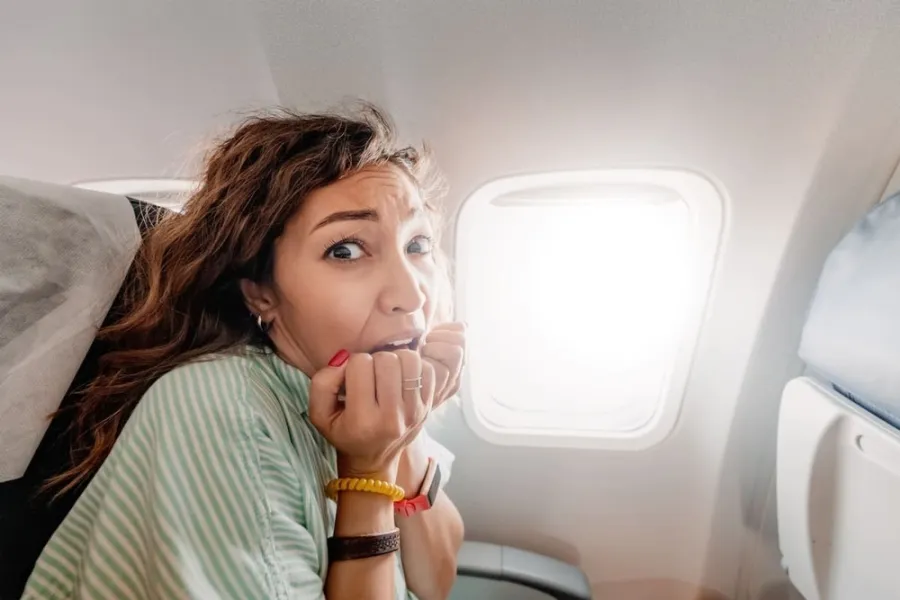Change language
How to overcome the fear of flying? 8 methods
December 17, 2024

The probability of being hit by a meteorite during your lifetime is approximately 1 in 1.6 million. Plane accidents are even rarer: 1 in 11 million flights! Do you know what that means? You are more likely to win the lottery than to experience a plane crash. [1, 2]
The fear of flying is an intense emotional reaction of fear or anxiety that arises at the thought of flying. It can be debilitating, but it is not invincible. In this article, you can discover 8 effective methods to overcome the fear of flying.
Understanding the fear of flying: what it is and why it occurs
This phobia, also known as aviophobia, is an intense and irrational fear of flying or even thinking about the possibility of flying. You should know that this fear doesn’t appear overnight. It is the result of a combination of causes that can range from negative experiences related to flying, such as turbulence or panic during a flight, to hearing stories about plane crashes. It can also be linked to other fears, such as claustrophobia or acrophobia.
There are many causes that can lead to the development of this fear, and they vary from person to person. One of the most common causes is flight-related trauma, such as a flight with turbulence or even an accident. Sometimes, the fear can be inherited from parents—if one of your parents is afraid of flying, you may adopt this fear. Other reasons can include social anxiety, germophobia, or claustrophobia.
The impact of the fear of flying on your life can be significant. It can limit travel opportunities, cause stress and anxiety before planned trips, and lead to avoiding social or professional situations that involve flying.
Here are the top 11 largest airports in Europe!
How to identify and understand your flight-related fears?
First and foremost, you need to ask yourself what exactly triggers your anxiety about flying:
what am i afraid of when it comes to flying?
Is it a fear of heights?
Is it about losing control?
Am I afraid of accidents, turbulence, or enclosed spaces?
Identifying the source of your fear helps you address it directly and focus your efforts effectively.
Next, recognize your automatic thoughts! write down the thoughts that arise when you think about flying.
Examples: what if the plane crashes? or i can’t escape if something goes wrong. identifying these thoughts allows you to analyze them and confront them with realistic information.
Observe how your body reacts when you think about flying: palpitations, sweating, rapid breathing? this can indicate the intensity of your fear and help you prepare to manage it.
Then, try to identify any negative or irrational thoughts that appear when you think about flying. if you constantly think about the possibility of a plane crash, it’s important to realize that this is an irrational thought, considering that flying is one of the safest modes of transportation.
Finally, create a list of worst-case scenarios and confront them! write down the most frightening scenarios you can imagine (for example: "the plane will crash").
then answer:
How likely is it to happen?
What safety measures are in place to prevent it?
What are the actual facts vs. my exaggerated thoughts?
8 methods to overcome the fear of flying
Overcoming the fear of flying can be a gradual process, but it is achievable. Here are 8 useful methods to reduce and eventually eliminate this fear, ensuring you can fully enjoy the comfort of flying and benefit from compensation for flight delays or cancellations.
1. Learn more about airplanes and flying!
Gaining detailed knowledge about the flying process and airplanes can help reduce fears stemming from the unknown. Start by learning about the structure and mechanisms of an airplane. Discovering how and why a plane flies, as well as the weather conditions in which it can safely operate, can be a significant step.
It’s important to know that aviation has numerous controls and safety measures in place to ensure a secure journey. Strict standards for airplane maintenance and inspections, rigorous crew training, and air traffic control all contribute to flight safety.
2. Practice breathing and relaxation techniques!
Have you ever thought about how something as simple as breathing can be so powerful in managing anxiety? The 4-7-8 breathing technique is an extremely effective method for calming the nervous system. It’s a simple and accessible exercise that you can practice whenever you feel anxiety creeping in.
Inhale deeply through your nose, counting to four.
Hold your breath for seven seconds.
Slowly exhale through your mouth for eight seconds.
Repeat this process several times until you feel your heartbeat slow down and your anxiety begin to fade.
3. Gradual exposure
Gradual exposure is a technique for adapting to flying through step-by-step stages:
Start with something simple, like visiting an airport. This is the first step in familiarizing yourself with the flying environment, and your presence there can reduce the anxiety associated with flying. You'll begin to understand how everything works, from baggage check, check-in, to boarding, which can help you feel safer.
Choose a quiet day and stroll through the airport terminal. Observe how passengers board and disembark from planes. Notice the calmness and efficiency with which airport staff work. You’ll see people of all ages, from children to seniors, all participating in the same travel experience.
Watch airplanes as they take off and land. This is an excellent way to get used to the sounds and movements of airplanes. Observe the details: how the wheels move, how doors open and close, how the runways light up. This experience helps you better understand the mechanics of flight and realize it is a controlled and safe process.
4. Focus on the destination, not the flight!
By focusing on the destination instead of the flight, you’ll be able to better manage your fear of flying. Learn to shift your perspective, concentrate on the positives, and visualize your destination. In this way, you can turn flying from a stressful experience into an exciting and thrilling one.
To make this mindset shift easier, you can try visualization techniques. Picture your destination, imagine how you’ll explore new places, enjoy local cuisine, marvel at beautiful scenery, and participate in fun activities. These are the moments that truly matter, not the few hours spent on a plane.
Before your flight, make sure you know what items are allowed and which are prohibited onboard!
5. Avoid stimulants!
Coffee, energy drinks, or other caffeinated beverages can intensify feelings of nervousness and anxiety. Your nervous system is often under increased tension during flights, and consuming stimulants can amplify this tension.
What happens if, instead of fueling your nerves with caffeine, you choose to skip these stimulants before your flight? The benefits can be significant. In addition to reducing anxiety levels, you might experience improved sleep quality during the flight. Plus, you’ll feel calmer and more relaxed overall.
6. Use distractions!
Here’s a step-by-step guide on how to use distractions to manage your fear of flying:
Choose the best seat on the plane when booking your flight.
Plan what you’ll do during the flight the day before – read a book, watch a movie, listen to music, or play games.
Ensure all your electronic devices are fully charged before the flight.
Before takeoff, prepare your noise-canceling headphones and pick your entertainment source.
During the flight, focus on what truly captures your attention, not the airplane's sounds or sensations.
If you feel anxiety, combine distractions with breathing or visualization techniques.
7. Talk to the crew!
The cabin crew is there to ensure a safe flight, provide support, and help you feel more at ease. So, if you feel uneasy or have a question, don’t hesitate to reach out to them! This is a simple and direct way to manage your fears and ensure your flight goes as smoothly as possible.
The flight crew is specially trained to handle stressful situations. In case of a panic or anxiety episode, you don’t have to feel alone. These professionals are prepared to assist you and help you calm down.
8. If the fear persists, consult a specialist!
Cognitive-behavioral therapy (CBT), a form of psychotherapy, can help you identify and change the negative thoughts associated with flying. This type of therapy is not just a temporary solution but provides long-term tools to effectively address and manage this issue.
If the fear persists and interferes with your daily life or travel plans, it’s essential to consult a specialist, such as a psychologist or psychiatrist. They can provide personalized support and recommend additional treatments, such as group therapy, hypnotherapy, or EMDR (Eye Movement Desensitization and Reprocessing).
Sometimes, short-term medications may be an option to help manage flight-specific anxiety. It’s important to discuss this option with a doctor, as not all medications are suitable for everyone and may have side effects. Here are some rules and recommendations for transporting medication during air travel!
Adopt these methods based on your level of anxiety and be patient with yourself! The fear of flying is common but can be managed effectively.
Sources:
[1] Howard, Brian Clark. “What Are the Odds a Meteorite Could Kill You?” Science, 9 Feb. 2016, www.nationalgeographic.com/science/article/160209-meteorite-death-india-probability-odds. Accessed 20 Nov. 2024.
[2] “Chances of a Plane Crash | Facts & Figures | Family Travel Genie.” Familytravelgenie.com, 2023, familytravelgenie.com/chances-of-a-plane-crash/. Accessed 20 Nov. 2024.
More travel blog recommendations

Turn your delayed, cancelled or overbooked flight into a compensation up to €600!
Flight delay compensation canceled
Flight refund for a canceled or delayed flight
Flight compensation
©2026 AirClaim.com - All rights reserved Air Claim SA - Bdul. Pipera 1/Vi Bl. HYPERION TOWERS Et. 3 SP. BIR. 3 Cod 077190, Voluntari, Ilfov, România


















